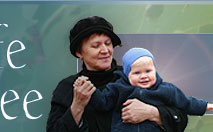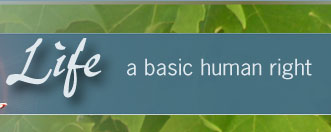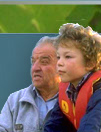Diane Meier, MD
Soros/PDIA scholar, RWJF national program director; founder of Center to Advance Palliative Care . CAPC was a principal organization in RWJF's Last Acts program, and has become a keystone in the National Hospice and Palliative Care Organization. NHPCO is one of a few organizations that have collaborated to develop a consensus statement on palliative care protocols for hospitals and nursing homes, and for federally funded programs such as Medicare and Veterans Administration. CAPC operates Palliative Care Leadership Centers across the United States.
Dr. Meier was quoted in a Miami Herald article regarding Terri Schiavo. Dr. Meier's statement begs the question: If this is a peaceful way to die, why does one need morphine to mask the pain?
http://www.miami.com/mld/miamiherald/living/health/7025255.htm
Posted on Thu, Oct. 16, 2003
"Without a feeding tube, Terri Schiavo will die of dehydration.
Without fluids, the patient becomes dehydrated. This means less blood flow to the most important organs -- the brain, kidneys, heart, lungs, skin, said Dr. G. Patricia Cantwell, a University of Miami pediatric intensive care physician.
As the kidneys stop functioning, the body can't expel its waste, and the buildup of toxins can cause the patient to lose consciousness.
Some physicians believe that dehydration makes the patient produce endorphins -- which are released during exercise and alleviate pain.
As the patient gets weaker and can no longer breathe effectively, the body takes in less oxygen and expels less carbon dioxide. Without oxygen, the cells can't function; carbon-dioxide buildup can cause the patient to lose consciousness.
While it's difficult to gauge pain in unconscious patients, Cantwell said, doctors watch for grimaces or changes in vital signs and can give medicines like valium, or morphine.
'''It's a very peaceful and dignified way to die,'' said Dr. Diane E. Meier, the director of the Hertzberg Palliative Care Institute in New York's Mount Sinai School of Medicine. [']The patient might stop breathing, or die from an underlying condition like a weak heart.'"
Linda Emanuel, MD
Founder of the Education for Physicians in End-of-Life Care Project (EPEC) at Northwestern University. Funding sources include RWJF (over $3 million) and Soros's PDIA.
Quoted in New York Times, 3/20/05:
"'From the data that is available, it
is not a horrific thing at all' . . . In fact,
declining food and water is a common way that
terminally ill patients end their lives, because
it is less painful than violent suicide and
requires no help from doctors. Terri Schiavo,
who is in a persistent vegetative state, is
'probably not experiencing anything at all subjectively,'
said Dr. Emanuel, and so the question of discomfort,
from a scientific point of view, is not in dispute."
Sean Morrison, MD
Open Society Institute Scholar; Mt. Sinai School of Medicine; University of Florida Institute on Aging (IoA) steering committee
"They generally slip into a peaceful coma," he said. "It's very quiet, it's very dignified - it's very gentle."
Joanne Lynn, MD
Co-designer of the famous SUPPORT research, upon which all of the Last Acts projects were predicated. President of Americans for Better Care of the Dying. Head of the Medicaring project, the goal of which is to persuade the chronically ill to refrain from using emergency rooms and acute care facilities. Head of the team that produced State Initiatives in End-of-Life Care: Policy Guide for State Legislators. Dr. Lynn's funding has been provided by Soros, RWJF, and Fan Fox and Leslie R. Samuels Foundation.
From the Washington Post, 3/23/05:
"'I usually tell families not to expect that it will necessarily be very quick,' said Joanne Lynn, a researcher at Rand Corp. and an expert on care of the terminally ill. In her experience, patients who forgo even water can live as long as 21 days, although most die in seven to 10. But there is no large series of cases on which to base predictions because 'nobody has actually sat down and studied this.'
On the subject of withdrawal of hydration/nutrition in general, Dr. Lynn, quoted in an article by Karen Kaplan, describes how to humor a family who wants continued feeding:
“It's one thing when a competent dying person refuses tube feeding and can explain her choice, while reassuring loved ones that she's not in pain. It's another to make that decision for someone who is unconscious or incompetent.
“The symbolism of feeding can be so powerful that families who know that their loved one would not want to be kept alive may still feel that stopping feeding is taboo. In such cases, according to Dr. Lynn and other geriatricians, a compromise can often be reached.
“'Usually you can honor the symbol without hurting the patient,' Dr. Lynn explains. 'You can run an IV with the family's awareness that it is at a very low rate,' so that it does not cause edema or other side effects, but the family feels reassured. The moment when family members are watching a loved one die is not the time to debate their assumptions or educate them about the physiology of the dying process.”
Porter Storey, MD
American Academy of Hospice and Palliative Medicine executive vice president (a position created as result of a Soros grant)
From the Washington Post, 3/23/05:
"'Their breathing slows down, and then their next breath doesn't come,' he said yesterday. 'Does that mean the brain, which sends a signal to the lungs, goes first? Or does it mean the lungs failed? We do not precisely know why people die, and it is not something that can be answered by scientific experiment.'
Storey said that in his hospice practice he has 'sat at the bedside of thousands of patients as they died, and many of them could tell me how they were feeling when they had gone weeks without eating and drinking.' What they told him, he said, was that they did not feel bad at all."
William Knaus, MD
Designer of SUPPORT.
Commenting on death by dehydration, in the Washington Post, 3/23/05:
“'You go into a uremic coma. You go into a stuporous state, and you stay that way until you die,' said William A. Knaus, who co-directed the intensive care unit at George Washington University Medical Center for 20 years and is now at the University of Virginia. 'There is absolutely no indication that the body reacts to this with stress.'”
National Hospice and Palliative Care Organization
(NHPCO)
NHPCO is one member of a five-agency collaborative
that is producing clinical guidelines for palliative
care that will be the model for accreditation
of palliative care service across the United States.
This is from the NHPCO statement on the day that the feeding tube was removed (in 2003)
http://www.nhpco.org/i4a/pages/index.cfm?pageid=3956&openpage=3956
"NHPCO wishes to acknowledge the quality care being provided and hopes that the family, caregivers and all those touched by this tragic situation may find peace and healing in the days ahead."
NHPCO "Talking Points" for the Schiavo case, posted at
http://www.nhpco.org/i4a/pages/index.cfm?pageid=3970&openpage=3970
"Theme: Hospice not involved in legal issues
Message: Neither the specific hospice provider nor HNPCO [sic] is involved in the legal proceedings or feeding decisions associated with this case.
Supporting Point:
- Hospice does not make decisions for patients or families, nor sit in judgement of their choices."
Ronald Cranford, MD
(Hastings Center; and U. of Minnesota; Choice in Dying board member. Choice in Dying was the precursor to Partnership for Caring and Last Acts.)
From WorldNetDaily article on Terri Schiavo case:
"One of the two neurologists Felos solicited to give expert
testimony in last week's trial, Dr. Ronald Cranford,
is a bioethicist and renowned proponent of euthanasia.
Cranford calls himself, "Dr. Humane Death."
According to the staff directory for the University
of Minnesota Medical School, "Dr. Cranford
has specialized in the field of clinical ethics
since the early 1970s. During this time, he
served as a consultant to several national commissions
on right-to-die issues." Dr. Cranford is
a familiar face at right-to-die trials across
the country. He authored a portion of a book
titled "Intended Death: The Ethics of Assisted
Suicide and Euthanasia." His section deals
with the "physician's role in killing and
the intentional withdrawal of treatment."
Perry Fine, M.D.
Partnership for Caring board member; VP of Medical Affairs at National Hospice & Palliative Care Organization (NHPCO)
Quoted in Los Angeles Times, 3/23/05:
"What my patients have told me over the last 25 years is that when they stop eating and drinking, there's nothing unpleasant about it -- in fact it can be quite blissful and euphoric," said Dr. Perry G. Fine, vice president of medical affairs at the National Hospice and Palliative Care Organization in Arlington, Va. "It's a very smooth, graceful and elegant way to go."
In the same article:
"[Terri Schiavo's] reflexes with respect to thirst or hunger are as broken as her ability to think thoughts or dream dreams or do anything a normal, healthy brain does," Fine said."
Charles Sabatino, JD
American Bar Association; Last Acts
Boston Globe, 2/23/05:
". . . what the [Schindlers] see when
they look at Terri Schiavo 'is 180 degrees different
and contradicts what every neurologist sees,'
Sabatino said."
[Editor's note: In fact, there was no unanimity in “what every neurologist sees.” Outside this little clique of right-to-die advocates, Terri Schindler-Schiavo's diagnosis and treatment were debatable, if not controversial. It is important to note that the news media routinely interviewed the same small group of physicians and bioethicists, mostly from within the right-to-die cadre. The process was helped along by an RWJF-funded RTNDA handbook that provided sources from Choice in Dying and other right-to-die groups. This left an impression with the public that there was unanimity within the medical community — an impression that was entirely false.]
Joseph Fins, MD
Last Acts task force director; Partnership for Caring board. Funding sources include Soros's PDIA, RWJF, and Fan Fox and Leslie R. Samuels Foundation.
Fins on the restoration of Terri Schiavo's feeding tube, in a story dated 10/23/03 [emphasis added]:
http://www.cbsnews.com/stories/2003/09/18/health/main573832.shtml
"After six-and-a-half days of not being fed, not receiving hydration there's going to have been inevitably damage and it's just going to prolong the dying process," said medical ethicist Dr. Joseph Fins.
Also a story dated 10/17/03:
"The CBS Morning News featured medical ethicist Joseph Fins during its report Thursday. He echoed the claims made by Terri's husband, Michael Schiavo, his attorneys and doctors that Terri is essentially brain-dead.
'And she is in a chronic and permanent vegetative state,' Fins said, 'and our science indicates that, that is not a state from which one recovers.'
No mention was made in the report of more than a dozen medical experts, including neurologists, who have submitted affidavits on behalf of the Schindler family, including Terri's parents, indicating that the woman is consciously attempting to interact with her environment and is a good candidate for therapy."
Karen Orloff Kaplan, MPH, ScD:
Choice in Dying/Partnership for Caring; Last Acts
Quoted online:
". . . Although they do not have Mrs.
Schiavo’s words to guide them, several
courts have found credible the evidence of her
wish not to exist in her current situation.
Partnership for Caring and Last Acts support
this country's rule of law and thus the courts'
decisions."
Russell Portenoy, MD
President, American Pain Society; Soros/PDIA grant recipient; vice-chairman, American Board of Hospice and Palliative Medicine (ABHPM)
From:
http://www.cbsnews.com/stories/2003/09/18/health/main573832.shtml
"'Those probably are automatic responses and the family is fooling itself,' end-of-life expert Dr. Russell Portenoy told CBS News.
'A patient in a persistent vegetative state who lacks all of those higher brain functions can sometimes engage in movements that appear as if they are reacting meaningfully with others, but actually they're not,' he said."
"To have an individual politician make decisions that have such a direct impact on a medical problem of this magnitude and complexity is a problem."
Ronald Schonwetter, MD
Treasurer, American Association of Hospice and Palliative Medicine (AAHPM); past chair of American Board of Hospice and Palliative Medicine (ABHPM)
Quoted in St. Petersburg Times:
"'Most of the time these are very peaceful deaths,'" said Dr. Ronald Schonwetter, chief medical officer at LifePath Hospice in Tampa and director of geriatric medicine at the University of South Florida.
'The patients are very comfortable, and it's a very humane way to die,' he said. 'Our belief is that they do not experience any pain.'
As time passes, Schonwetter said, Mrs. Schiavo will become more lethargic and eventually lapse peacefully into a coma."
Carolyn Cassin, MPA
Former CEO of Hospice of Michigan; member of National Hospice Work Group; former COO of VistaCare.
Quoted in a 4/1/05 article on National Women's Health Information web site)
"It's very natural that patients at the end of life choose to stop eating and drinking," added Carolyn Cassin, CEO of Continuum Hospice Care in New York City. "It happens in almost every case. The patient begins to relax, doesn't feel hunger, doesn't feel thirst and dies a very, very peaceful death.
"In our hospice, this situation happens every day where someone is unable to speak for themselves, but they have given the right to make decisions about their care to someone else," Cassin said.
. . . . "It's always ambiguous. You don't know what kind of effect a treatment is going to have," Cassin said. "We look at what the patient wants to do with their life. That's what's at the heart of this, what Terri would have wanted." "The issue isn't whether it's clear-cut or not. It's never totally clear-cut," she continued. "That isn't something anyone in the medical profession knows. But what we can know is, 'How do you want to live your life.' "
Mary Labyak, MSSW, LCSW
President, Hospice of the Florida Suncoast; a national director and Treasurer of National Hospice and Palliative Care Organization (NHPCO)
From an opinion column in Miami Herald, posted on Sun, Oct. 26, 2003
'''Our job here at the hospice is to follow, not lead,'' she added. 'None of us know where this will go in the next couple of weeks or what this might mean long term.'''
Note: In October, 2004, Mary Labyak participated in an NHPCO plenary panel with Joseph Fins and William Colby (Cruzan lawyer). Oddly enough, the session was titled "A Leadership Approach to Family Decision Making at the End of Life"
Lofty Basta, MD
Founder, Project GRACE; professor of medicine,University of South Florida College of Medicine, Clearwater
From a letter to the editor of the St. Petersburg Times, 9/27/03:
"I would like to draw to your attention to the fact that Mrs. Schiavo, as a person, died 13 years ago."
Kenneth Goodman, Ph.D.
(Florida Partnership for End-of-Life Care -- RWJF's Community-State Partnerships; Florida Bioethics Network; Director of Bioethics Program at University of Miami; journalist; influential in advance directives legislation in Florida)
From a March, 2005 article:
"[Goodman, who] is the director of the Bioethics program at the University of Miami has followed the case closely. He says such reactions from close relatives in end-of-life cases are not unusual, but medical experts who have examined Terri S[c]hiavo say she will never regain consciousness. "There is no cognition in this poor woman," he said. "There is nothing going on in her poor head. It is a tragedy and it has torn a family apart but the medical facts are not in dispute among credible physicians. She is in a persistent vegetative state. The fact of the matter is that her cerebral cortex is full of spinal fluid. She is incapable of experiencing or thinking anything."
Bill Allen, JD
Director of bioethics program at University of Florida School of Medicine. Florida Bioethics Network speakers' bureau. Co-investigator for the Florida Partnership for End-of-Life Care (the RWJF-funded Community-State Partnership program).
Quoted in an article by Maya Bell, from the Orlando Sentinel, 3/13/05, picked up at kansascity.com:
"'The consensus is it's immoral to force
medical treatment on people that they didn't
want, and there is no reason to treat artificial
hydration or sustenance any differently than
any other medical treatment,' Allen said. 'This
is not about food and water. This is an attempt
for people with one value system to impose their
values on the rest of society.'"
And this from an exchange with Wesley J. Smith on Court TV, quoted by Smith at National Review Online:
"Wesley Smith: Bill, do you think Terri is
a person?
Bill Allen: No, I do not. I think having awareness is an essential criterion for personhood. Even minimal awareness would support some criterion of personhood, but I don't think complete absence of awareness does.
. . . Wesley Smith: If Terri is not a person, should her organs be procured with consent?
Bill Allen: …Yes, I think there should be
consent to harvest her organs, just as we allow
people to say what they want done with their
assets."
Last updated Wed, May 24, 2006 10:52 PM
|







